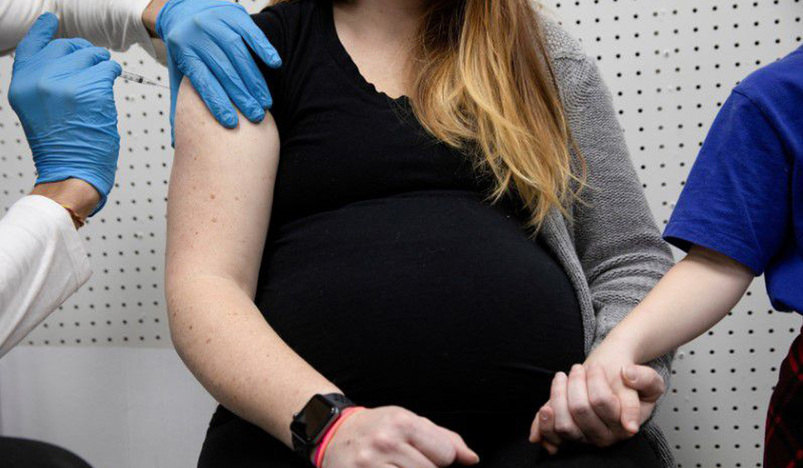
A pregnant woman receives a vaccine for the coronavirus disease (COVID-19) at Skippack Pharmacy in Schwenksville, Pennsylvania, U.S., February 11, 2021. REUTERS/Hannah Beier/File Photo
REUTERS
Pregnant women should be vaccinated against COVID-19, based on a new analysis that did not show increased risk for miscarriage, the U.S. Centers for Disease Control and Prevention said on Wednesday.
The CDC said it has found no safety concerns for pregnant people in either the new analysis or earlier studies. It said miscarriage rates after vaccination were similar to the expected rate. Pregnant women can receive any of the three vaccines given emergency authorization -- Pfizer (PFE.N), Moderna (MRNA.O) or Johnson & Johnson (JNJ.N).
The agency had not previously recommended pregnant women get vaccinated but had said that they should discuss vaccination with their health care providers.
Sascha Ellington, team lead for the Emergency Preparedness and Response team in CDC's Division of Reproductive Health, said that vaccine uptake in pregnant women has been low, with only 23% receiving at least one vaccine dose.
"We want to increase that," Ellington said, noting that the agency was working on strategies to have obstetricians and gynecologists become vaccine providers. "We want women to be protected. We're not seeing any safety signals and so the benefits of vaccination really do outweigh any potential or unknown risks."
Pregnancy increases the risk of severe illness from COVID-19, according to the CDC, and COVID-19 during pregnancy increases the risk for preterm birth.
The CDC said it now recommends all people 12 years and older get vaccinated against COVID-19, including people who are pregnant, breastfeeding, trying to get pregnant or might become pregnant in the future.
"We are aware of the myths that have been spreading related to fertility. They are not based on any evidence. There's no science that backs that up," Ellington said. "We hope this helps."
The new guidance comes as cases and hospitalizations have surged across the country in the past month. Some hospitals in Arkansas, Florida, Louisiana and Mississippi have run out of beds, and the outbreak is spreading beyond the epicenter in the U.S. South to Oregon and Washington state.
Reporting by Michael Erman in New York; Editing by Lisa Shumaker
.jpg)
Qatar Secures Place Among the World's Top 10 Wealthiest Nations
.jpg)
Hamad International Airport Witnesses Record Increase in Passenger Traffic

Saudi Arabia: Any visa holder can now perform Umrah

What are Qatar's Labour Laws on Annual Leave?
Leave a comment